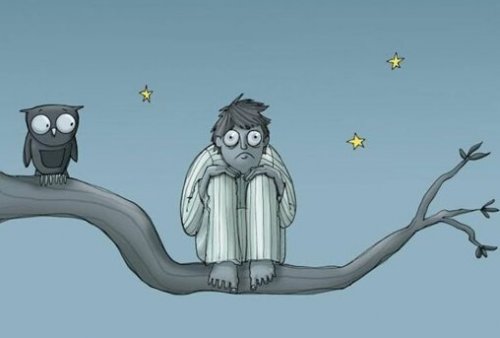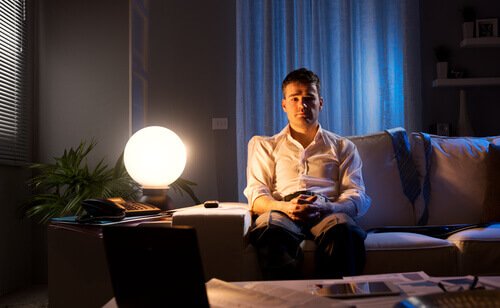Stress-Related Insomnia: When Your Worries Keep You from Resting


Written and verified by the psychologist Valeria Sabater
Stress-related insomnia isn’t uncommon. Difficulty falling asleep is often conditioned by an overactive mind. Sometimes it feels impossible to shut our brain down before going to bed. Our thoughts and worries may be so prominent that they keep us from falling asleep. After many sleepless nights, we may suffer from extreme exhaustion.
Insomnia isn’t a deadly disease. However, it takes away the quality of life of those who suffer from it. It’s important to recall that an insomniac brain is synonymous with an incapacity to focus, retain new information, and react to simple stimuli in an effective way.
All of this creates a vicious cycle where a lack of rest ends up magnifying stress. Little by little, we can go from transitory insomnia to a chronic sleep disorder. This isn’t an easy problem to deal with. The lack of restful sleep is, in fact, one of the main causes of traffic accidents.
In fact, the Chernobyl nuclear accident of 1986 was the result of a human error caused by the workers’ lack of rest. Likewise, we can’t ignore the fact that prolonged stress-related insomnia generates social, physical, and cognitive deterioration. This can end up causing depression.
“Insomnia is a gross feeder. It will nourish itself on any kind of thinking, including thinking about not thinking.”
-Clifton Fadiman-

Stress-related insomnia: What causes it?
The Psychosomatic Medicine journal published a study that doctors Charles M. Morin and Sylvie Rodriguez carried out. This study concluded something that most of us can guess. We all experience stress on a day-to-day basis, right? But sometimes that stress ends up taking over. It’s too much for us to handle.
Thus, when the brain interprets that it doesn’t have control over many of those stressful situations, it experiences hyperactivation. The smallest problems take on excessive dimensions and everything becomes a threat. Little by little, we enter a state where our thoughts weigh us down. Our thoughts end up devouring us, making us angsty, and filling us with fear during the night.
On the contrary, people who have adequate coping skills deal with stress more appropriately. Said skills allow them to prevent the intrusion of disruptive thoughts at night.
“I think the most common cause of insomnia is simple; it’s loneliness.”
-Heath Ledger-
Characteristics and effects of chronic insomnia
Stress-related insomnia isn’t linked to any organic disease. Let’s see some telltale signs of this condition:
- Difficulty falling asleep.
- Waking up several times during the night, which may sometimes make it impossible to fall asleep again.
- Difficulty finding a comfortable position to sleep in.
- Intrusive thoughts and mental images.
- Nightmares.
- Digestive pains, shivering, and nocturnal headaches.

On the other hand, stress-related insomnia can be transitory (if it has a duration of 2 days up to 2 weeks). However, it can also become chronic primary insomnia if it lasts for more than 3 weeks. In the latter case, the person begins to present the following symptoms:
- Irritability.
- Fatigue.
- Trouble concentrating.
- Poor work performance.
- Somatic complaints: muscular pains, digestive problems, and headaches.
After the first month, the person can begin to experience dysphoria, apathy, and helplessness. As we pointed out, and as a study conducted at the University of Texas showed, chronic insomnia can cause depression in many cases.
How to fight stress-related insomnia
Dr. Daniel J. Taylor from the University of Texas at San Antonio reminded us in an interesting article published in the International Review of Psychiatry that a lot of people who want to treat insomnia resort to drugs rather than psychological therapy.
If the patient doesn’t learn to manage the trigger, which is stress in this case, they may end up developing a psychological disorder. Therefore, cognitive-behavioral therapy is, undoubtedly, one of the most effective treatments for stress-related insomnia.

On the other hand, it’s also useful to incorporate some simple strategies:
- Make sure your bed is comfortable and that you have a suitable mattress.
- External stimuli such as lights and noise must be minimal.
- Aerate and humidify your bedroom.
- The sleep temperature should be between 16°C and 18°C (61°F and 64°F).
- Follow a routine. This means you should go to bed at the same time every day.
- Avoid watching TV or using your phone or computer an hour before going to bed. It’s better to go to bed reading a book.
- Avoid having heavy meals for dinner.
- Practices such as mindfulness help fight stress-related insomnia. Don’t hesitate to start combining breathing with meditation.
Don’t be afraid to ask for professional help if your sleeping problems extend for over 2 weeks. A hyperactive mind and troubling thoughts, don’t only keep you from sleeping, but also take away your quality of life.
“When you have insomnia, you’re never really asleep, and you’re never really awake.”
-Chuck Palahniuk-
Stress-related insomnia isn’t uncommon. Difficulty falling asleep is often conditioned by an overactive mind. Sometimes it feels impossible to shut our brain down before going to bed. Our thoughts and worries may be so prominent that they keep us from falling asleep. After many sleepless nights, we may suffer from extreme exhaustion.
Insomnia isn’t a deadly disease. However, it takes away the quality of life of those who suffer from it. It’s important to recall that an insomniac brain is synonymous with an incapacity to focus, retain new information, and react to simple stimuli in an effective way.
All of this creates a vicious cycle where a lack of rest ends up magnifying stress. Little by little, we can go from transitory insomnia to a chronic sleep disorder. This isn’t an easy problem to deal with. The lack of restful sleep is, in fact, one of the main causes of traffic accidents.
In fact, the Chernobyl nuclear accident of 1986 was the result of a human error caused by the workers’ lack of rest. Likewise, we can’t ignore the fact that prolonged stress-related insomnia generates social, physical, and cognitive deterioration. This can end up causing depression.
“Insomnia is a gross feeder. It will nourish itself on any kind of thinking, including thinking about not thinking.”
-Clifton Fadiman-

Stress-related insomnia: What causes it?
The Psychosomatic Medicine journal published a study that doctors Charles M. Morin and Sylvie Rodriguez carried out. This study concluded something that most of us can guess. We all experience stress on a day-to-day basis, right? But sometimes that stress ends up taking over. It’s too much for us to handle.
Thus, when the brain interprets that it doesn’t have control over many of those stressful situations, it experiences hyperactivation. The smallest problems take on excessive dimensions and everything becomes a threat. Little by little, we enter a state where our thoughts weigh us down. Our thoughts end up devouring us, making us angsty, and filling us with fear during the night.
On the contrary, people who have adequate coping skills deal with stress more appropriately. Said skills allow them to prevent the intrusion of disruptive thoughts at night.
“I think the most common cause of insomnia is simple; it’s loneliness.”
-Heath Ledger-
Characteristics and effects of chronic insomnia
Stress-related insomnia isn’t linked to any organic disease. Let’s see some telltale signs of this condition:
- Difficulty falling asleep.
- Waking up several times during the night, which may sometimes make it impossible to fall asleep again.
- Difficulty finding a comfortable position to sleep in.
- Intrusive thoughts and mental images.
- Nightmares.
- Digestive pains, shivering, and nocturnal headaches.

On the other hand, stress-related insomnia can be transitory (if it has a duration of 2 days up to 2 weeks). However, it can also become chronic primary insomnia if it lasts for more than 3 weeks. In the latter case, the person begins to present the following symptoms:
- Irritability.
- Fatigue.
- Trouble concentrating.
- Poor work performance.
- Somatic complaints: muscular pains, digestive problems, and headaches.
After the first month, the person can begin to experience dysphoria, apathy, and helplessness. As we pointed out, and as a study conducted at the University of Texas showed, chronic insomnia can cause depression in many cases.
How to fight stress-related insomnia
Dr. Daniel J. Taylor from the University of Texas at San Antonio reminded us in an interesting article published in the International Review of Psychiatry that a lot of people who want to treat insomnia resort to drugs rather than psychological therapy.
If the patient doesn’t learn to manage the trigger, which is stress in this case, they may end up developing a psychological disorder. Therefore, cognitive-behavioral therapy is, undoubtedly, one of the most effective treatments for stress-related insomnia.

On the other hand, it’s also useful to incorporate some simple strategies:
- Make sure your bed is comfortable and that you have a suitable mattress.
- External stimuli such as lights and noise must be minimal.
- Aerate and humidify your bedroom.
- The sleep temperature should be between 16°C and 18°C (61°F and 64°F).
- Follow a routine. This means you should go to bed at the same time every day.
- Avoid watching TV or using your phone or computer an hour before going to bed. It’s better to go to bed reading a book.
- Avoid having heavy meals for dinner.
- Practices such as mindfulness help fight stress-related insomnia. Don’t hesitate to start combining breathing with meditation.
Don’t be afraid to ask for professional help if your sleeping problems extend for over 2 weeks. A hyperactive mind and troubling thoughts, don’t only keep you from sleeping, but also take away your quality of life.
“When you have insomnia, you’re never really asleep, and you’re never really awake.”
-Chuck Palahniuk-
All cited sources were thoroughly reviewed by our team to ensure their quality, reliability, currency, and validity. The bibliography of this article was considered reliable and of academic or scientific accuracy.
- Baglioni, C., Battagliese, G., Feige, B., Spiegelhalder, K., Nissen, C., Voderholzer, U., … Riemann, D. (2011, December). Insomnia as a predictor of depression: A meta-analytic evaluation of longitudinal epidemiological studies. Journal of Affective Disorders. https://doi.org/10.1016/j.jad.2011.01.011
- Gross, CR, Kreitzer, MJ, Reilly-Spong, M., Wall, M., Winbush, NY, Patterson, R.,… Cramer-Bornemann, M. (2011). Reducción del estrés basada en la atención plena versus farmacoterapia para el insomnio primario crónico: un ensayo clínico aleatorizado y controlado. Explore: The Journal of Science and Healing , 7 (2), 76–87. https://doi.org/10.1016/j.explore.2010.12.003
- Morin, C. M., Rodrigue, S., & Ivers, H. (2003). Role of stress, arousal, and coping skills in primary insomnia. Psychosomatic Medicine, 65(2), 259–267. https://doi.org/10.1097/01.PSY.0000030391.09558.A3
- Zayfert, C., & De Viva, J. C. (2004). Residual Insomnia Following Cognitive Behavioral Therapy for PTSD. Journal of Traumatic Stress, 17(1), 69–73. https://doi.org/10.1023/B:JOTS.0000014679.31799.e7
This text is provided for informational purposes only and does not replace consultation with a professional. If in doubt, consult your specialist.







